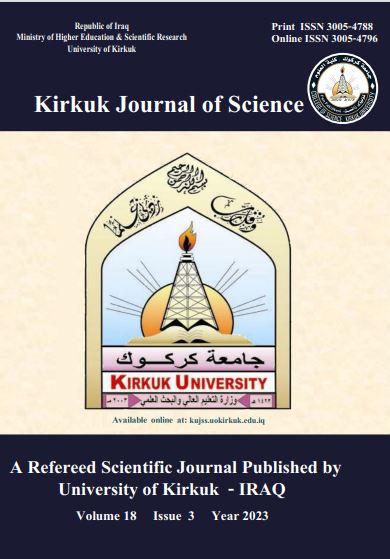Abstract
The study investigates the effects of pomegranate peel extracts on some
virulence factors such as the production of some enzymes produced
by Proteus spp isolated from different clinical samples. Among 310
different clinical samples, 48 isolates of proteus were obtained, 14
isolates(29.16%)were obtained from urine, 15 isolates (31.25%) were
obtained from stool, 7 isolates (14.58%) from ear swabs, 4 isolates
(8.33%) were obtained from wounds, 5 isolates (10.41% (from burns
and 3 isolates) 6.25%) of the high cervical. The study showed that
from 48 isolates of Proteus spp 25 isolates (52.08%) identified as
P.mirabilis, 15 isolates (31.25%)of P. penerri, while 8 isolates of P.
vulgaris were obtained with a percentage of (16.66%) and it was
found that 18 isolates (72%) of P.mirabilis isolates were positive for
the production of beta-lactamase enzyme, 24 isolates (96%) are
positive for proteases and 14 isolates (56%) produced lipase, while
13 isolates from P. penerri (86.66%) produced beta-lactamases and
proteases and 10 isolates (66.66%) produced lipase, also found that
5 isolates (62.5%) of P. vulgaris produced Beta-lactamase and all the
isolates (100%) produced protease while 7 isolates (87.5%) produced
lipase. It was found that the hot aqueous extract of pomegranate
peels inhibited the production of beta-lactamase enzyme in 4 out of
7 isolates that produced this enzyme, while all tested isolates did
not produce lipase by using extracts of pomegranate peel extracts.
The isolates lost their ability to produce protease enzyme, except for
two isolates that were not affected by extracts of pomegranate peel fruits.
virulence factors such as the production of some enzymes produced
by Proteus spp isolated from different clinical samples. Among 310
different clinical samples, 48 isolates of proteus were obtained, 14
isolates(29.16%)were obtained from urine, 15 isolates (31.25%) were
obtained from stool, 7 isolates (14.58%) from ear swabs, 4 isolates
(8.33%) were obtained from wounds, 5 isolates (10.41% (from burns
and 3 isolates) 6.25%) of the high cervical. The study showed that
from 48 isolates of Proteus spp 25 isolates (52.08%) identified as
P.mirabilis, 15 isolates (31.25%)of P. penerri, while 8 isolates of P.
vulgaris were obtained with a percentage of (16.66%) and it was
found that 18 isolates (72%) of P.mirabilis isolates were positive for
the production of beta-lactamase enzyme, 24 isolates (96%) are
positive for proteases and 14 isolates (56%) produced lipase, while
13 isolates from P. penerri (86.66%) produced beta-lactamases and
proteases and 10 isolates (66.66%) produced lipase, also found that
5 isolates (62.5%) of P. vulgaris produced Beta-lactamase and all the
isolates (100%) produced protease while 7 isolates (87.5%) produced
lipase. It was found that the hot aqueous extract of pomegranate
peels inhibited the production of beta-lactamase enzyme in 4 out of
7 isolates that produced this enzyme, while all tested isolates did
not produce lipase by using extracts of pomegranate peel extracts.
The isolates lost their ability to produce protease enzyme, except for
two isolates that were not affected by extracts of pomegranate peel fruits.
Keywords
pomegranate; enzymes; proteus spp.
Abstract
بينت الدراسة في تأثير مستخلصات قشور الرمان على إنتاج بعض عوامل الضراوة مثل الإنزيمات التي تنتجها بكتيربا Proteus spp المعزولة من عينات سريرية مختلفة. تم جمع 310 عينة سريرية مختلفة ومنها تم الحصول على 48 عزلة من عزلات المتقلبات Proteus spp اذ تم الحصول على 14 عزلة (29.16٪) من البول و 15 عزلة (31.25٪) من البراز و 7 عزلات (14.58٪) من مسحات الأذن و 4 عزلات (8.33٪) من الجروح و 5 عزلات (10.41٪) من الحروق و 3 عزلات( 6.25٪) من عنق الرحم. أوضحت الدراسة أنه من بين 48 عزلة وجد ان 25 (52.08٪) منها شخصت على انها P. mirabilis وتم الحصول على 15 عزلة (31.25٪) من P. penerri ، في حين تم الحصول على 8 عزلات من P. Vulgaris بنسبة (16.66٪). وجد أن 18 عزلة (72٪) من عزلات P. mirabilis كانت موجبة لإنتاج إنزيم بيتا لاكتاميز، 24 عزلة (96٪) كانت موجبة للبروتييز و 14 عزلة (56٪) أنتجت الليبييز، بينما 13 عزلة (86.66) من P. penerri أنتجت انزيم البيتا لاكتامازات وانزيم البروتييز و 10 عزلات (66.66٪) أنتجت الليبيز، كما وجدت أن 5 عزلات (62.5٪) من P. vulgaris أنتجت البيتا لاكتاميز وجميع العزلات (100٪) أنتجت البروتييز بينما أنتجت 7 عزلات (87.5٪) الليبيز. وجد أن المستخلص المائي الحار لقشور الرمان ثبط إنتاج إنزيم البيتا لاكتاميز في 4 عزلات من أصل 7 أنتجت هذا الإنزيم، في حين أن جميع العزلات المختبرة لم تنتج الليبيز باستخدام مستخلصات قشر الرمان. فقدت العزلات قدرتها على إنتاج إنزيم البروتييز باستثناء عزلتين لم تتأثرتا بمستخلصات قشور ثمار الرمان.
Keywords
قشور الرمان، انزيمات، المتقلبات.
